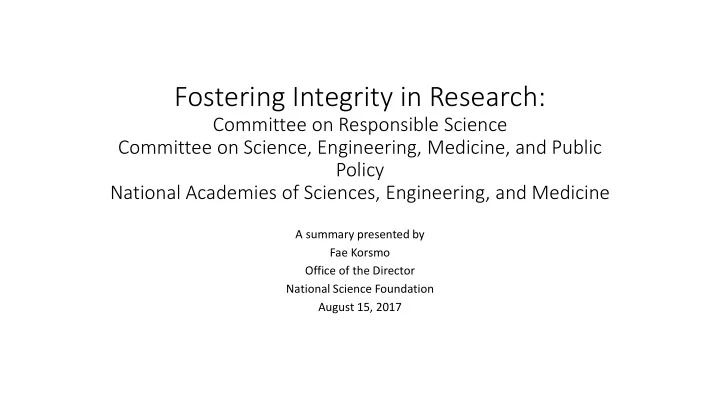

Fostering Integrity in Research: Committee on Responsible Science Committee on Science, Engineering, Medicine, and Public Policy National Academies of Sciences, Engineering, and Medicine A summary presented by Fae Korsmo Office of the Director National Science Foundation August 15, 2017
Background In 1992 the National Academies released the report, Responsible Science. Fostering Integrity in Research started out as an update. However, taking into account trends and challenges in technology, globalization, collaboration across disciplines and sectors, growing competition, and other factors, it became much more. !mong the several sponsors were NSF’s Office of Inspector General and Department of Health and Human Services’ Office of Research Integrity. 2
Committee on Responsible Science: Members Robert M. Nerem (Chair), Georgia Institute of Technology Ann M. Arvin, Stanford University Rebecca M. Bergman, Gustavus Adolphus College Moses H. Chan, Pennsylvania State University C.K. Gunsalus, University of Illinois at Urbana-Champaign Deborah G. Johnson, University of Virginia Michael Keller, Stanford University W. Carl Lineberger, University of Colorado Brian C. Martinson, HealthPartners Institute Victoria Stodden, University of Illinois at Urbana-Champaign Sara E. Wilson, University of Kansas Paul Root Wolpe, Emory University Levi Wood, Georgia Institute of Technology 3
Outline of the Report • Part One: The Integrity of Research • Introduction • Foundations: Core Values and Guiding Norms • Trends and Changes in the Environment • Part Two: Research Misconduct and Detrimental Research Practices • Context and Definitions • Incidence and Consequences • Understanding the Causes • Addressing Misconduct and Detrimental Research Practices * • Exploring New Approaches • Part Three: Fostering Integrity • Best Practices for Research Integrity • Education in the Responsible Conduct of Research • Findings and Recommendations * Defined as failure to share data/code, misleading use of statistical methods, authorship misrepresentation other than plagiarism, abusive/neglectful supervision 4
Findings and Recommendations: • Recognize the complex interactions among the many components of the research system • All stakeholders in the research enterprise should improve their policies and practices on research integrity – researchers, research institutions, research sponsors, journals, and societies • Research sponsors should invest in research to quantify and develop responses to conditions associated with research misconduct and detrimental research practices • Research sponsors and research institutions should develop, assess, and implement more effective approaches to Responsible Conduct of Research Education 5
How does this affect NSF? • In accordance with America COMPETES, NSF policy requires that institutions have a plan in place to provide appropriate training and oversight in the responsible and ethical conduct of research to undergraduates, graduate students, and postdoctoral researchers who will be supported by NSF to conduct research • While NSF does not specify content or method of training, Fostering Integrity notes that RCR training is most effective when it is one element in a comprehensive approach to improve an institution’s system of research • NSF’s program, “Cultivating Cultures for Ethical STEM,” (CCE -STEM) funds research on responsible scientific practices and how to instill students with this knowledge 6
Next Steps: • Remind the community of the NSF policy with an Important Notice • Continue to support research (e.g., through the CCE-STEM program) • Respond to the OIG Conclusion: “…NSF awardees could benefit from NSF providing written guidelines or templates for universities to follow…and from the sharing of best practices with the broader community” • Welcome discussion here 7
Recommend
More recommend